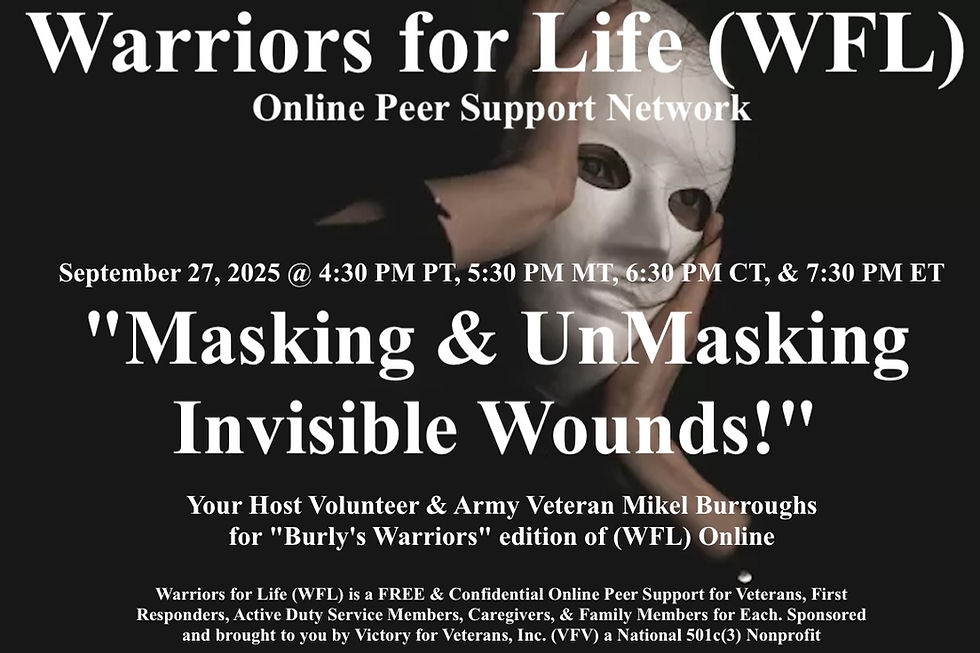Join Mikel & Friends for "Masking & Unmasking Invisible Wounds!" TONIGHT with WFL
- Col (Ret) Mikel Burroughs

- Sep 26, 2025
- 3 min read
Drop in TONIGHT with Volunteer and Army Veteran Mikel Burroughs for "Burly's Warriors" edition of Warriors for Life (WFL) Online, presented by Victory for Veterans, Inc. (VFV).
We are asking everyone to share who we are and what support that Victory for Veterans, Inc. (VFV) is providing via WFL. If you know someone who is a veteran, first responder or a family member/caregiver, please ask them to join us for at least one meeting so they can learn more about what we do and how they can share their wisdom with others who may be able to learn from them.

TONIGHT's Topic: "Masking & Unmasking Invisible Wounds!"

Join Mikel, Bella, & Friends, TONIGHT and let's get together online for the Warriors for Life (WFL) as we talk about "Masking & Unmasking Invisible Wounds!"

What is Masking and Unmasking when it comes to invisible wounds and mental health?

Masking is the act of hiding one's true emotions, trauma responses, or symptoms to appear "normal" and conform to societal expectations. Unmasking, by contrast, is the process of intentionally reducing and stopping these masking behaviors in favor of expressing one's authentic self.

Masking invisible wounds

An "invisible wound" is a broad term for mental health conditions, traumatic brain injuries, and emotional injuries that are not outwardly visible. People mask these conditions to avoid stigma, judgment, or potential career and social repercussions.
Common examples of masking behavior include:
Presenting an "everything is fine" facade. An individual might be struggling with depression or trauma but act cheerful and positive around others to hide their true feelings.
Mimicking social cues. Neurodivergent individuals, such as those with autism or ADHD, may force eye contact, rehearse conversations, or copy others' behaviors to fit in.
Suppressing physical or behavioral symptoms. This could involve hiding repetitive movements (stimming) associated with neurodivergence or controlling facial expressions to appear calm.
Overcompensating to conceal struggles. Someone with ADHD might become an overachiever to hide executive functioning challenges, while a person with anxiety might be overly talkative to mask their discomfort.
The consequences of masking
While masking may offer a sense of temporary safety, it is often a trauma response that can be incredibly damaging to a person's long-term mental health. The costs include:
Exhaustion and burnout. The constant effort of suppressing true emotions and behaviors is mentally and physically draining, and can lead to burnout.
Worsened symptoms. Masking can increase anxiety and depression and may even prevent individuals from seeking the help they need to address their trauma.
Loneliness and isolation. By hiding their struggles, people can feel disconnected from others and may struggle to form genuine, authentic relationships.
Erosion of self-identity. After years of masking, an individual may lose their sense of self and feel disconnected from their own needs and feelings.
Unmasking for healing

Unmasking is a therapeutic process of self-acceptance where a person slowly and intentionally sheds their coping mechanisms and expresses their true self. It is a key step in healing invisible wounds and is not a sudden, all-or-nothing event.
Strategies for unmasking include:
Finding safe spaces. A person begins unmasking in supportive, trusting environments with people who will not be judgmental of their authentic self.
Self-compassion. The process involves recognizing and accepting one's vulnerabilities and differences, releasing the shame that drove the need to hide.
Mindfulness. Practices that increase self-awareness can help an individual recognize when they are masking and connect with their authentic feelings.
Professional guidance. A therapist can help individuals identify the origins of their masking behavior, process underlying trauma, and provide tools for self-expression.
Setting boundaries. Unmasking often involves learning to say "no" to people and situations that are emotionally draining and push a person toward masking.
Our Vision at Victory for Veterans, Inc. (VFV) is simple: "Where Hope, Support, and Healing come together!"
We encourage you to join us, Everyone is Welcome, Everyone Matters, You Matter to Us, so Talk to Us! — invite a friend!

Warriors for Life (WFL) Peer Support Network Online "Burly's Warriors" edition, presented by Victory for Veterans, Inc. (VFV) — (TONIGHT), September 27, 2025 @ 4:30 PM PT, 5:30 PM MT, 6:30 PM CT, & 7:30 PM ET
Join Zoom Meeting: https://us06web.zoom.us/j/87197441247
Remember: Warriors for Life (WFL) Online, presented by Victory for Veterans, Inc. (VFV) meets on Saturdays, Sundays, Mondays, Tuesdays, Wednesdays, Thursdays and Fridays — (7-days) a week. Every week stay connected on Friday Mornings with "Coffee with Kim" and Monday Mornings for "Cup O' Joe" with Derrick at 8:00 AM CT.
“Everyone Matters, Talk to Us!"— Army Veteran Mikel Burroughs
Thank you,
Army Veteran Mikel Burroughs
Founder & Volunteer Facilitator, Warriors for Life (WFL), & CEO, Victory for Veterans, Inc. (VFV)




Comments